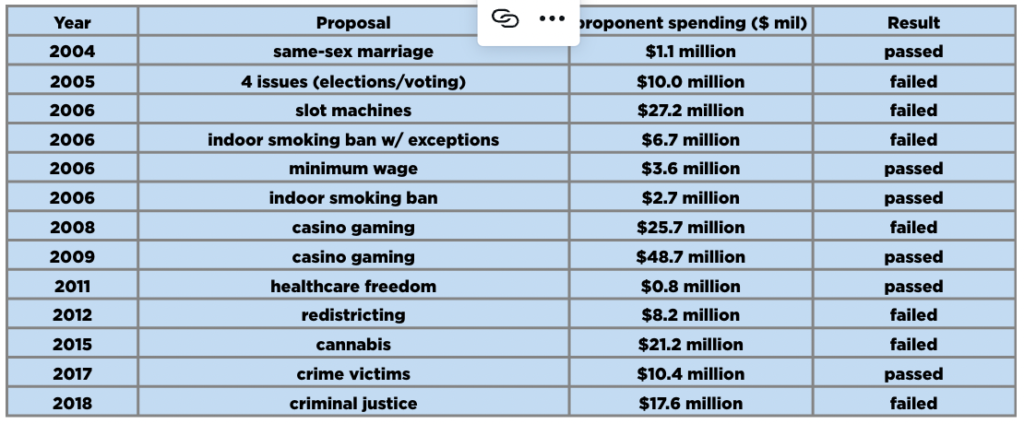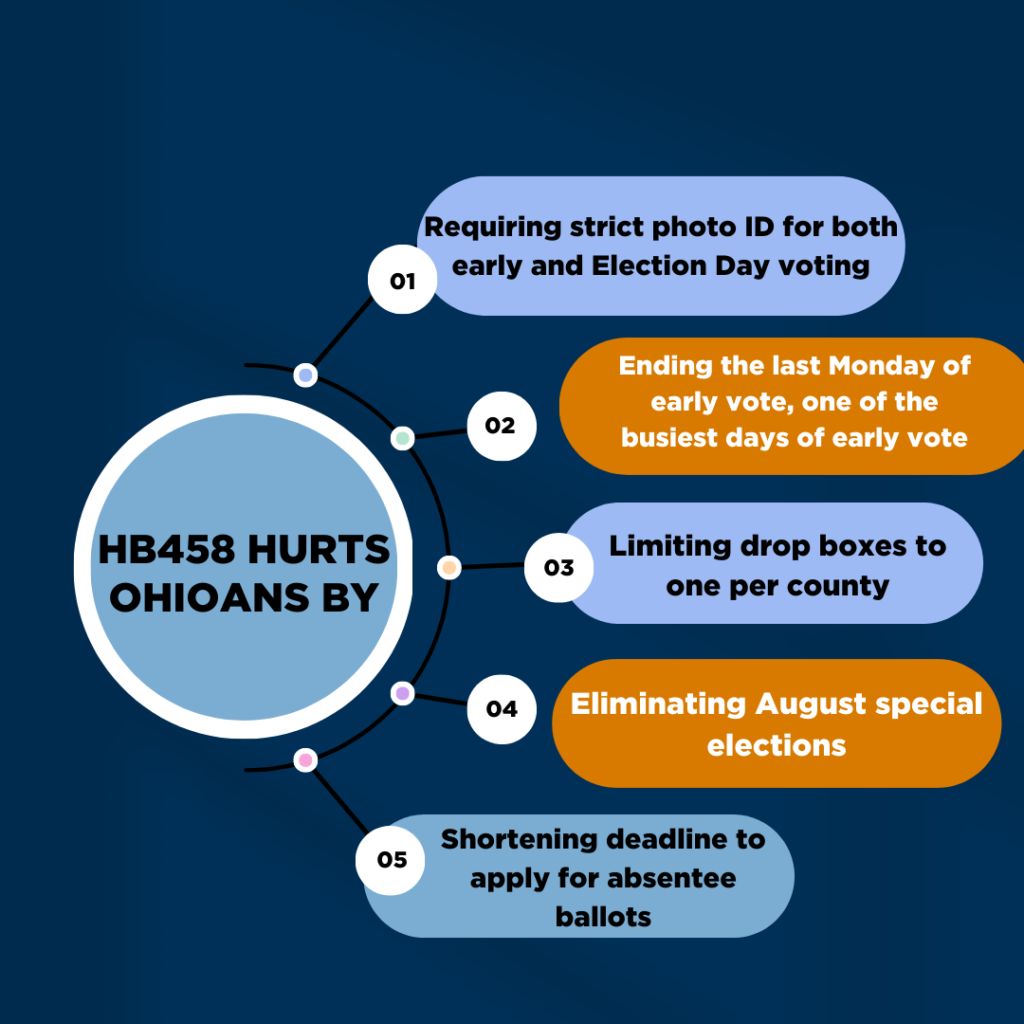| Innovation Ohio is thrilled to share our 2023 Annual Report with all of you. As a trusted voice in Ohio’s progressive community, our goal has always been to build and scale the essential elements of infrastructure, research, communication, and policy to defeat the extremist’s agenda and ensure a multi-cycle progressive comeback in Ohio. This year, we met the moment by creating a successful strategy for the 2023 election cycle. Securing victories at the ballot for democracy and reproductive freedom while also educating the public on new voting requirements. Our projects reached Ohioans in every corner of the state and showed the national strength of progressive causes and advocacy efforts. |
About the August 8 Election
Ohioans will head to the polls on August 8 to vote on the question of how hard it should be to amend the state constitution through the citizen initiative process.
Despite eliminating August elections last year, Ohio lawmakers have changed course and scheduled a statewide vote on August 8 on a proposal that would make it harder for citizens to amend Ohio’s constitution by initiative petition.
The timing of the August special election was designed to get ahead of a vote on abortion rights later this year. Advocates filed over 700,000 signatures in July, placing an amendment on the ballot in November to protect the right to an abortion. Statehouse republicans now want to change the results of the game and require a 60% yes vote in order to influence the outcome of important policy decisions best left to voters
Here’s what you need to know about participating in the August election:
Get the Facts: Senate Joint Resolution 2
Ohio Senate Joint Resolution 2, a constitutional amendment proposal that would change the threshold for passing new amendments to the state constitution. If passed by the voters on August 8th, the amendment would increase the required vote to 60% of the electorate, up from the current simple majority threshold. This proposal has generated significant debate and discussion among Ohioans, with opinions divided on whether the higher threshold would help or hinder the democratic process.
To help voters understand the Facts vs. Myths in this important debate, Innovation Ohio has provided the following overview. Whether you’re a staunch supporter of the change or a skeptic of its effects, this overview will be a valuable resource for voters who want to make an informed decision at the ballot box.
SJR 2 Facts
SJR 2 are legislative proposals that would increase the votes required to enact new constitutional amendments to 60%, up from a simple majority (50% +1).
Unfortunately, there has been a lot of misinformation used to gain support for these proposals. Here are the facts.

Since 1912, 19 constitutional amendments have been intimated by citizens, while legislators have initiated a whopping 108. Since 2022, 14 of 19 originated in the legislature.
In reality, most citizen-proposed constitutional amendments fail. Since 1912, 69 constitutional amendments have been proposed, and only 19 have passed, making for a success rate of 27.5%.
There has also been an emphasis from backers of SJR2 on the influence of deep-pocketed special interests in amending Ohio’s constitution, but there is no correlation between the amount spent on a citizen ballot initiative and its chance of passing. Successful campaigns have actually spent less, on average, than the backers of failed campaigns.

$11.2 million is the average amount spent on successful citizen ballot measure, compared to an average of $16.7 million on failed citizen ballot measures.

- Washington requires 50%+1 except amendments about gambling and lottery laws require 60%
- Arizona requires 50%+1 except amendments that raise taxes or impose fees require 60%
- Illinois requires 60%; or a measure can pass with 50% of all votes cast in the election.
- Nevada requires a majority vote (50%+1) in two successive elections
- Oregon requires 50%+1 but 50% voter turnout in the election
- Massachusetts requires 50%+1 and 30% of those voting in that election
- Nebraska requires 50%+1 AND 35% of the total votes cast in that election
- Mississippi requires 50%+1 AND 40’% of the total votes cast in that election
- Wyoming requires 50%+1 AND 50% of the total votes cast in that election
Political power-grab advances in Ohio House/Senate
Despite public outcry, GOP advances HJR1/SJR2 to floor vote
COLUMBUS — Today, Desiree Tims, President/CEO of Innovation Ohio condemned House Joint Resolution 1 (HJR1) and Senate Joint Resolution 2 (SJR2), proposed constitutional amendments that increases the passage thresholds of new amendments to 60% of the vote, up from a simple majority.
“HJR1/SJR2 are blatant political power-grabs by special interests and corrupt politicians, which seeks to undermine our democracy and silence the voice of the people”, said Desiree Tims. “We stood with Ohioans from every corner of the state to stand up and provide opposition testimony to these bills. Today, our voices were cut short, cast-aside, and ignored. This is not how democracy is supposed to work,” said Desiree Tims. “It has become clear that the only supporters of these bills are out-of-state special interests and corrupt politicians.”
Innovation Ohio is one of 225 organizations that have signed on to oppose these bills. This united coalition represents millions of everyday Ohioans who do not want their vote diminished.
“These proposed amendments would shred our Constitution as we know it, end majority rule in Ohio, and take away our right to decide what happens here by undermining the sacred principle of ‘one person, one vote,” said Desiree Tims.
If these amendments are passed, they will undermine majority rule and give a small number of voters (just 40%) the power to block initiatives that a majority of Ohio voters support. Ohioans need to protect our freedom to determine our own future.
We call on Speaker Stephens to not advance HJR1/SJR2.
HB 458: Voter Suppression in Disguise
After hours on Friday, January 6, 2023, Governor Mike DeWine signed House Bill 458 (HB 458) into law. While originally proposed in 2021 as a 15-page bill intended to eliminate most August special elections, the final 157-page version amended by House Republicans and enacted by DeWine, features an extensive list of alarming updates to Ohio’s election laws, including: a photo identification (ID) requirement for all voters, including provisional voters and those confined in Ohio jails or hospitals; the elimination of early voting on Mondays before Election Day and the six additional hours it provides voters to cast their ballots; a prohibition against a single 24/7 ballot drop box at county Boards of Elections (BOE); and the requirement that absentee ballots be requested sooner and received by BOEs by the close of polls on Election Day, regardless of their postmark date. Touted as an opportunity to promote election integrity, voting rights organizations across the state rightfully beg to differ.
In the days leading up to the passage of HB458, the Ohio Conference of the National Association for the Advancement of Colored People (NAACP) and the Ohio branch of the American Civil Liberties Union (ACLU), among other progressive organizations, protested the law’s failure to address the anticipated impact of this law on Ohio’s most vulnerable communities. According to Innovation Ohio’s President and CEO, Desiree Tims: “Experts tell us that as many as 11% of Ohio adults do not have a driver’s license or state ID card. Younger Ohioans are driving less, and many older and low-income Ohioans do not drive. That’s over 800,000 eligible adults who would have significant trouble voting under HB 458. If Governor DeWine values the freedom to vote and civil rights of Ohioans, then he will veto HB 458.”
Tim’s sentiments speak to the burden associated with obtaining a photo ID that will disproportionately fall upon poor, disabled and transient citizens that do not presently meet the requirements under HB 458; populations overrepresented by women and members of Black and immigrant communities. In practice, the cost of transportation to and from the Bureau of Motor Vehicles (BMV) where IDs must be obtained, and the administrative hassle associated with compiling the documents necessary to present to BMV officials, will operate as a sort of poll tax, and thus deterrent, for those who historically were able to provide various alternatives to photo ID as proof of identity at polling locations. Recent developments have also confirmed that certain Veteran ID cards will also be excluded from those accepted at BOEs; disenfranchising the very citizens whose sacrifices make American democracy possible.
This past December, North Carolina’s Supreme Court struck down a voter ID law for its disparate impact on Black voters and proof of discriminatory intent. Hoping for a similar outcome, the Northeast Ohio Coalition for the Homeless, Ohio Federation of Teachers, Ohio Alliance for Retired Americans and Union Veterans Council filed suit against Ohio’s Secretary of State Frank Larose and the 88 BOEs that will enforce the law. Arguing that it “will severely restrict Ohioans’ access to the polls—particularly those voters who are young, elderly, and Black, as well as those serving in the military and others living abroad” and “imposes needless and discriminatory burdens on Ohioans’ fundamental right to vote” in violation of the First and 14th Amendments of the U.S. Constitution, the Plaintiffs are prepared to exhaust all legal remedies to protect Ohio voters.
Until the courts reach a resolution, advocates must focus on educating their constituents regarding these sudden changes to Ohio’s election law, name those responsible for its enactment and prepare for an ultimately unfavorable decision in light of the Ohio Supreme Court’s composition. In doing so, voters will be empowered to recognize their allies and dispel the myth that Ohio Republican’s obsession with election integrity is anything more than voter suppression in disguise.
Innovation Ohio Statement on Charter School Provisions in Operating Budget
Ohio Lawmakers Showcase Three Bills to Close the Gender Wage Gap on Equal Pay Day
The persistent, pervasive wage gap remains a problem among working women in Ohio. Whether in low or high wage jobs, women experience wage gaps in nearly every sector of work, even when accounting for variables like education level and work experience #EqualPayDay #OhioEqualPayAct pic.twitter.com/YCi3GABKEM
— Women’s Public Policy Network (@OhioWPPN) April 2, 2019
Buckle up, Ohio’s budget season starts next Monday.

Republican governors pushing radical tax reforms that could be at Ohio’s doorstep soon
- 1
- 2
- 3
- 4
- Next Page »
